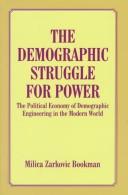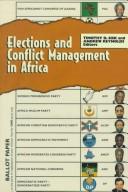| Listing 1 - 10 of 81 | << page >> |
Sort by
|
Book
ISBN: 9781108794411 9781108885454 9781108840293 Year: 2020 Publisher: Cambridge Cambridge University Press
Abstract | Keywords | Export | Availability | Bookmark
 Loading...
Loading...Choose an application
- Reference Manager
- EndNote
- RefWorks (Direct export to RefWorks)
Many scholars perceive ethnic politics in China as an untouchable topic due to lack of data and contentious, even prohibitive, politics. This book fills a gap in the literature, offering a historical-political perspective on China's contemporary ethnic conflict. Yan Sun accumulates research via field trips, local reports, and policy debates to reveal rare knowledge and findings. Her long-time causal chain of explanation reveals the roots of China's contemporary ethnic strife in the centralizing and ethnicizing strategies of its incomplete transition to a nation state-strategies that depart sharply from its historical patterns of diverse and indirect rule. This departure created the institutional dynamics for politicized identities and ethnic mobilization, particularly in the outer regions of Tibet and Xinjiang. In the 21st century, such factors as the demise of socialist tenets and institutions that upheld interethnic solidarity, and the rise of identity politics and developmentalism, have intensified these built-in tensions.

ISBN: 9781315037738 9781135248222 9781135248291 9781135248369 9780714647326 9780714642826 0714642827 Year: 1997 Publisher: London Cass
Abstract | Keywords | Export | Availability | Bookmark
 Loading...
Loading...Choose an application
- Reference Manager
- EndNote
- RefWorks (Direct export to RefWorks)
Ethnic groups - Political activity. --- Ethnic relations - Political aspects. --- Forced migration. --- Population transfers. --- Population policy. --- Boundary disputes. --- Ethnic groups --- Ethnic relations
Book
ISBN: 9780822988663 0822988666 9780822947028 Year: 2022 Publisher: Pittsburgh, Pa.
Abstract | Keywords | Export | Availability | Bookmark
 Loading...
Loading...Choose an application
- Reference Manager
- EndNote
- RefWorks (Direct export to RefWorks)
"The so-called Slovak question asked what place Slovaks held-or should have held-in the former state of Czechoslovakia. Formed in 1918 at the end of World War I from the remains of the Hungarian Empire, and reformed after ceasing to exist during World War II, the country would eventually split into the Czech Republic and Slovakia after the "Velvet Divorce" in 1993. In the meantime, the minority Slovaks often clashed with the majority Czechs over their role in the nation. The Slovak Question examines this debate from a transatlantic perspective. Explored through the relationship between Slovaks, Americans of Slovak heritage, and United States and Czechoslovakian policymakers, it shows how Slovak national activism in America helped the Slovaks establish a sense of independent identity and national political assertion after World War I. It also shows how Slovak American leaders influenced US policy by conceptualizing the United States and Slovakia as natural allies due to their connections through immigration. This process played a critical role in undermining attempts to establish a united Czechoslovakian identity and instead caused a divide between the two groups, which was exploited by Nazi Germany and then by other actors during the Cold War, and proved ultimately to be insurmountable"--
Nationalism --- Slovak Americans --- Slovaks --- Politics and government. --- Ethnic identity. --- Czechoslovakia --- Slovakia --- United States --- Ethnic --- relations Political aspects. --- Foreign relations
Book
ISBN: 9780674979796 Year: 2017 Publisher: Cambridge, Massachusetts : The Belknap Press of Harvard University Press,
Abstract | Keywords | Export | Availability | Bookmark
 Loading...
Loading...Choose an application
- Reference Manager
- EndNote
- RefWorks (Direct export to RefWorks)
Today, nations increasingly carry out geopolitical combat through economic means. Policies governing everything from trade and investment to energy and exchange rates are wielded as tools to win diplomatic allies, punish adversaries, and coerce those in between. Not so in the United States, however. America still too often reaches for the gun over the purse to advance its interests abroad. The result is a playing field sharply tilting against the United States. In a cogent analysis of why the United States is losing ground as a world power and what it can do to reverse the trend, War by Other Means describes the statecraft of geoeconomics: the use of economic instruments to achieve geopolitical goals. Geoeconomics has long been a lever of America's foreign policy. But factors ranging from U.S. bureaucratic politics to theories separating economics from foreign policy leave America ill prepared for this new era of geoeconomic contest, while rising powers, especially China, are adapting rapidly. The rules-based system Americans set in place after World War II benefited the United States for decades, but now, as the system frays and global competitors take advantage, America is uniquely self-constrained. Its geoeconomic policies are hampered by neglect and resistance, leaving the United States overly reliant on traditional military force. Drawing on immense scholarship and government experience, Robert Blackwill and Jennifer Harris show that if America's policies are left uncorrected, the price in American blood and treasure will only grow. What geoeconomic warfare requires is a new vision of U.S. statecraft.
Book
ISBN: 9780415818544 9780415741149 9781315797366 9781317753308 9781317753315 0415741149 Year: 2014 Publisher: London Routledge
Abstract | Keywords | Export | Availability | Bookmark
 Loading...
Loading...Choose an application
- Reference Manager
- EndNote
- RefWorks (Direct export to RefWorks)
This book is a comprehensive guide to theories of International Relations (IR). Given the limitations of a paradigm-based approach, it sheds light on eighteen theories and new theoretical perspectives in IR by examining the work of key reference theorists. The chapters are all written to a common template. The introductory section provides readers with a basic understanding of the theory's genesis by locating it within an intellectual tradition, paying particular attention to the historical and political context. The second section elaborates on the theory as formulated by the selected reference theorist. After this account of the theory's core elements, the third section turns to theoretical variations, examining conceptual subdivisions and overlaps, further developments and internal critique. The fourth section scrutinizes the main criticisms emanating from other theoretical perspectives and highlights points of contact with recent research in IR. The fifth and final section consists of a bibliography carefully compiled to aid students' further learning. Encompassing a broad range of mainstream, traditional theories as well as emerging and critical perspectives, this is an original and ground-breaking textbook for students of International Relations. The German edition of the book won the "Geisteswissenschaften International" Prize, collectively awarded by the Fritz Thyssen Foundation, the German Federal Foreign Office and the German Publishers & Booksellers Association.

ISBN: 2747550699 9782747550697 Year: 2003 Publisher: Paris Harmattan
Abstract | Keywords | Export | Availability | Bookmark
 Loading...
Loading...Choose an application
- Reference Manager
- EndNote
- RefWorks (Direct export to RefWorks)

ISBN: 1878379798 Year: 1998 Publisher: Washington, D.C. United States Institute of Peace Press
Abstract | Keywords | Export | Availability | Bookmark
 Loading...
Loading...Choose an application
- Reference Manager
- EndNote
- RefWorks (Direct export to RefWorks)
Conflict management --- Elections --- Representative government and representation --- Africa --- Ethnic relations --- Political aspects --- Elections - Africa. --- Representative government and representation - Africa. --- Conflict management - Africa. --- Africa - Ethnic relations - Political aspects.
Book
ISBN: 9781782388418 Year: 2015 Publisher: New York Oxford
Abstract | Keywords | Export | Availability | Bookmark
 Loading...
Loading...Choose an application
- Reference Manager
- EndNote
- RefWorks (Direct export to RefWorks)
No detailed description available for "Developmentality".
Book
ISBN: 0429974884 0429963807 0429495250 1283261510 9786613261519 0813346274 9780813346274 9780429495250 9781283261517 6613261513 Year: 2003 Publisher: New York Westview Press
Abstract | Keywords | Export | Availability | Bookmark
 Loading...
Loading...Choose an application
- Reference Manager
- EndNote
- RefWorks (Direct export to RefWorks)
Documents the decline of ethnic conflict in most world regions and discusses the growth of international responsibilities for anticipating and responding to ethnic conflict and humanitarian disasters.
Ethnic conflict. --- Ethnic relations -- Political aspects. --- Ethnic relations. --- Human rights. --- Minorities. --- World politics -- 1989-. --- World politics -- 20th century. --- World politics -- 21st century. --- World politics
Book
ISBN: 0774825855 9780774825856 9780774825863 0774825863 9780774825832 Year: 2014 Publisher: Vancouver UBC Press
Abstract | Keywords | Export | Availability | Bookmark
 Loading...
Loading...Choose an application
- Reference Manager
- EndNote
- RefWorks (Direct export to RefWorks)
Across the globe, more people are living in cities, be it through the movement of domestic populations from hinterlands or via international migration. This book offers answers to some of the most pressing questions of our day: Is globalization drawing urban populations together or tearing them apart? Does immigration exacerbate or ameliorate existing ethnic and nationalist conflicts in divided cities? Can institutional design help decision makers engender integration in diverse and contested urban settings? Contributors analyze the conditions under which cities from a broad range of geographical regions serve as sites of ethnic and national discord or amity. Particular attention is paid to the influence of economic globalization, cities’ entrenched ethno-linguistic configurations, and urban political institutions. A timely analysis of how the forces of urbanization and pluralization are shaping the world’s cities, this book discusses what can be done to encourage cities to act as vectors of integration and dialogue rather than conflict and segmentation.
| Listing 1 - 10 of 81 | << page >> |
Sort by
|

 Search
Search Feedback
Feedback About UniCat
About UniCat  Help
Help News
News